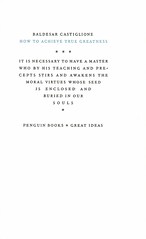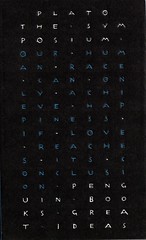 This is the ninth book I (randomly) picked to read out of the Penguin Great Ideas Series. It's number 29 in the list and part of series two (the blue series).
This is the ninth book I (randomly) picked to read out of the Penguin Great Ideas Series. It's number 29 in the list and part of series two (the blue series).To be honest, I found 'How to Achieve True Greatness' a bit hum drum. Firstly, I was expecting to find out how to achieve true greatness, and I totally didn't!!! I didn't even find out how to achieve normal greatness (though by the looks of it, I'd have no trouble doing that with google :-)
HtATG actually reminded me quite a bit of 'The Symposium' by Plato (which I did enjoy). In 'The Symposium' a group of (noble?) men discuss love, each making speeches describing and praising it. HtATG describes a gathering of noble men with the Duchess Elisabetta Gonganza and their dialogues describing the perfect Courtier. The perfect courtier, it turns out, must be many things - cultured, well written, of noble birth. Oddly enough, though, the dialogue also descends into love by the end, with discussions of whether older men have the right to love as younger men do and the consequences of it. (I did wonder if they'd possibly divereged from the topic somewhat).
To be fair, HtATG suffers from the same editing that has affected a number of books in the Great Ideas series. HtATC is not a book in itself, but instead is cut down from Castiglione's book 'The Book of the Courtier' (Il Cortegiano). I suspected this fairly early on because the book is littered with
[. . .]
This presumably indicated that text has been cut. I think this really contributed to the lack of direction in the book and the difficulty I had in remembering who was talking about what. Further still, where the original comprises 4 'books', this only takes excerpts of the first two, which probably augments the rather aimless conclusion this book also suffers from.
HtATG also suffers from one of the least impressive covers in the Penguin Great Ideas series too. For one thing the text on the cover is most definitely not centred (even more so than it appears in the scanned image). Perhaps this off-centered-ness is indicative of Italian Renaissance literature. I suspect, however, that coming late in the second series, Penguin may have been running out of ideas...
NEXT!!!



